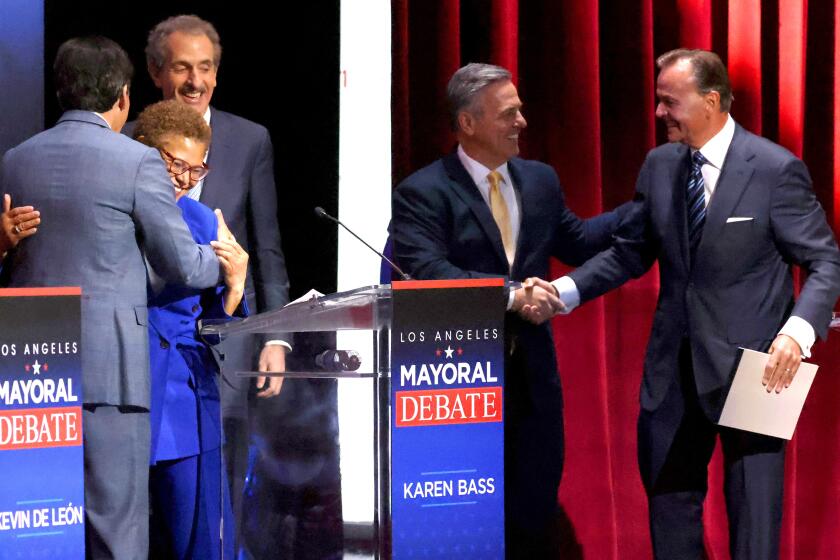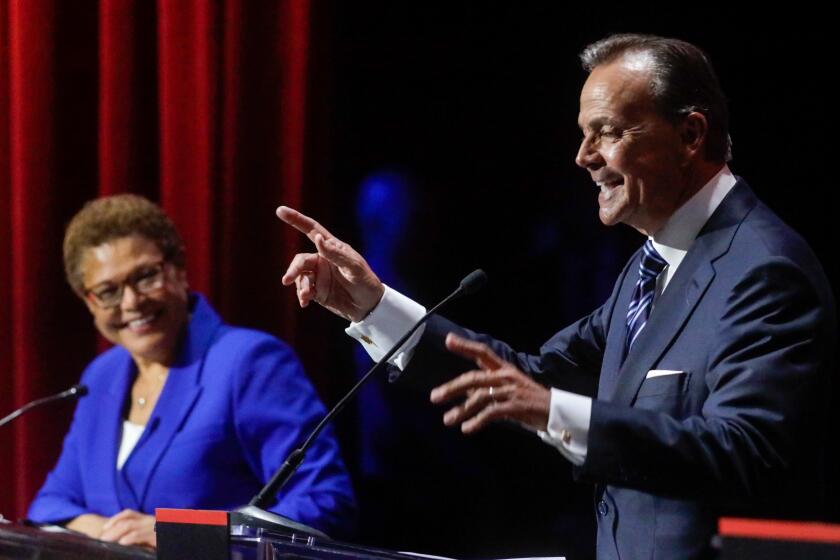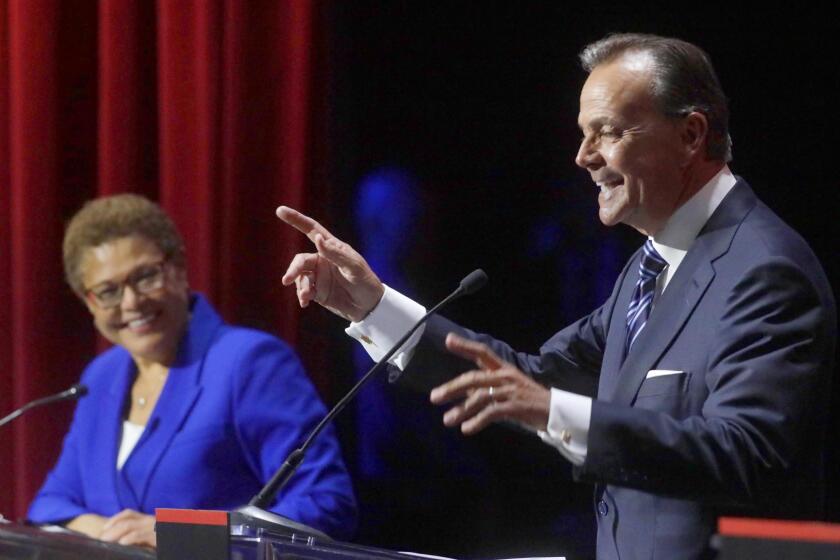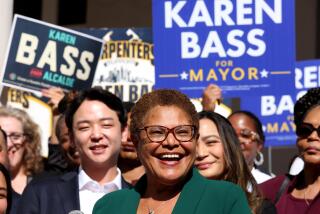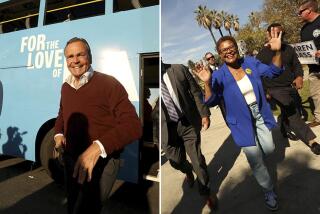Rivals take aim at Caruso (and his yacht) in his first mayoral debate
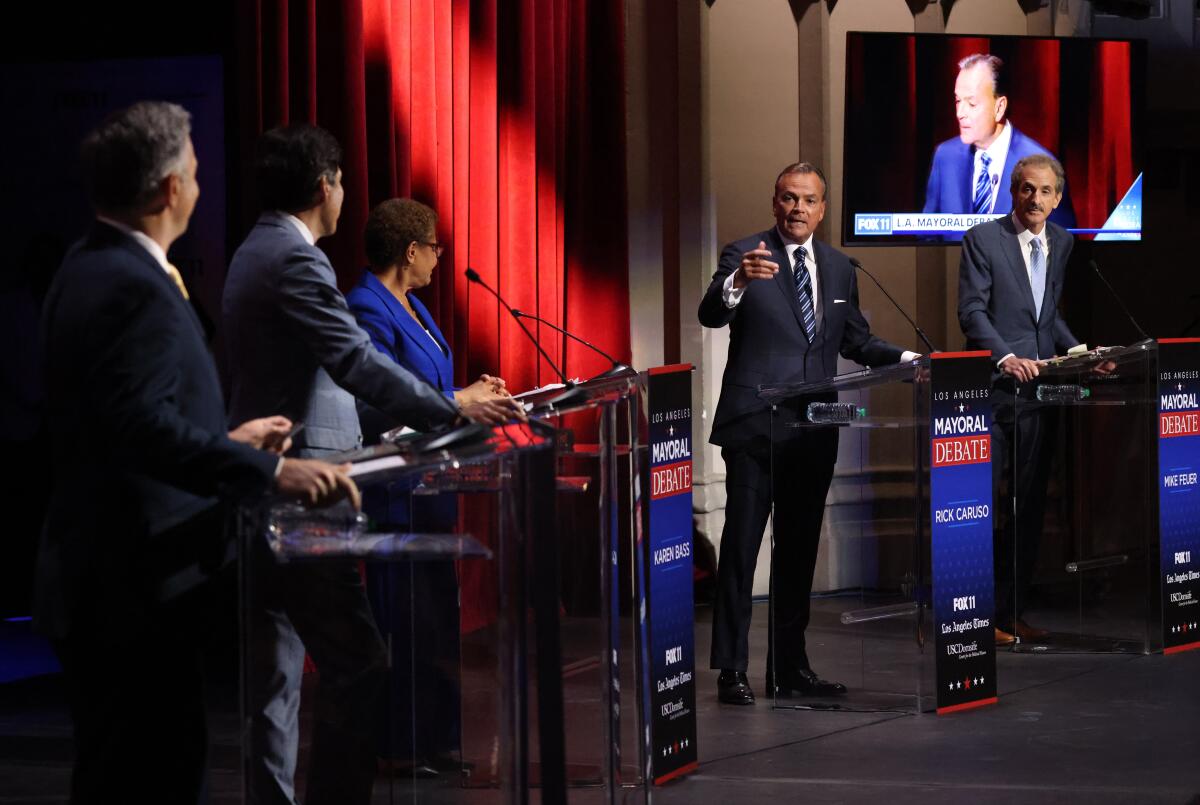
- Share via
The five leading candidates running to replace Mayor Eric Garcetti took part in a freewheeling debate on Tuesday over homelessness, crime and other issues, with many of the attacks trained on billionaire real estate developer Rick Caruso.
Councilman Joe Buscaino, Councilman Kevin de León and City Atty. Mike Feuer repeatedly took aim at Caruso, who was appearing onstage with the other candidates for the first time in the run-up to the June 7 election. Over the course of the evening, they targeted his police hiring plan, his business dealings and, in one exchange, his “$100-million” yacht.
Caruso, in turn, sought to attack several of his opponents at once, portraying them as career politicians who are ill-equipped to tackle rising gun violence, a persistent homelessness crisis and corruption at City Hall.
Those candidates, he said, have “a lot of great ideas, none of which were implemented before they ran for office.”
It was a zinger in a night of zingers, during an event where each candidate sought to carve out their identity.
Rep. Karen Bass, who has served a decade in Congress, spent much of the night attempting to stay above the fray, touting herself as a coalition builder — someone who has worked directly with President Biden and can “bring our city together.” She chided Caruso for taking shots at other elected officials.
“Some people have dedicated their entire life to not making money, but doing public service,” she said. “And they shouldn’t be denigrated for that.”
De León was more blunt, saying he had worked on fighting climate change in Sacramento and on finding housing for homeless people in L.A., building up a track record Caruso could “only dream of.”
“During the last two years of global pandemic, you were concerned with your rents at your mall and $14,000 nights at your hotel,” the councilman said, “while I was out there, knocking doors, giving vaccinations and PPE equipment and hot meals to everyday Angelenos.”
Tuesday’s forum was staged at USC’s Bovard Auditorium. Throughout the evening, several candidates repeatedly sought to emphasize that offstage, and outside the political arena, they were friends with each other. But for much of the evening, they were on the offensive.
Since entering the race last month, Caruso has been spending big on his campaign, airing television commercials, posting YouTube ads and purchasing other forms of paid media to tout his plans to fix L.A.’s crime, homelessness and corruption.
While most of the other candidates have had to raise money in $1,500 increments — the maximum permitted per donor per election cycle — Caruso, the developer of the Grove, Americana at Brand and other shopping centers, has been able to tap his personal wealth.
Second Los Angeles mayoral debate held at USC
The first attack came less than 10 minutes into the debate. Buscaino, before discussing his housing plans, quipped that he was glad Caruso “finally” was on the debate stage.
“I think I was attacked,” Caruso told the audience, looking amused. “It felt like an attack.”
Caruso responded by hitting Buscaino on homelessness, saying the number of unhoused in the councilman’s district had actually increased since he took office.
“The fact is, since you’ve been a city councilman, there’s 700 more people on the streets in your district alone,” Caruso said. “So I don’t know how you quantify success, when the problem has gotten worse under your leadership.”
Buscaino, for his part, seized on remarks made by Bass, who told the audience she did not want to pursue an approach to homelessness that would “criminalize poverty.”
“Is it criminalizing poverty to make sure our streets and our sidewalks are clear and safe of encampments?” he asked. “Is it criminalizing poverty to allow people to sit in their filth, to sit in human waste? That’s not compassionate.”
Tuesday’s debate was co-sponsored by The Times, USC Dornsife Center for the Political Future and Fox 11, with Times columnist Erika D. Smith and Fox 11 anchor Elex Michaelson serving as moderators.
The event was the second major televised debate in the run-up to the June 7 primary.
Who came off the best during Tuesday’s L.A. mayoral debate? Here’s what a few voters had to say.
Feuer, who has served on the council, in the state Legislature and in citywide office, talked up his experience. He repeatedly challenged Caruso, who has developed commercial and residential projects and has served on several city panels, including the powerful Board of Police Commissioners.
“You haven’t done much in the way of building homeless and affordable housing,” Feuer told Caruso. “All the opportunities you had, instead you’ve opposed rent control.”
Caruso responded by pointing out that Feuer’s offices were raided in 2019 by FBI agents in the sprawling scandal involving the Department of Water and Power and double-dealing by lawyers.
At another point, Feuer turned a question about Garcetti’s performance into another opportunity to challenge Caruso, asking the neophyte politician whether he was prepared to release his last five years of taxes. Caruso said he would, as soon as all the other candidates were ready to release theirs.
“I think you have a $100-million yacht that is registered under the flag of the Cayman Islands,” Feuer said, in issuing his challenge. “I think people here ought to be concerned about whether people are paying their fair share of taxes. I am prepared to release my taxes for the last five years tomorrow. Are you?”
After quipping about what a “great question” his opponent had asked, Caruso said: “I will release everything that I’ve paid in taxes, including the taxes on that boat, which I paid. I will release everything that I pay in taxes and believe me, I pay my fair share.”
Asked about crime, most of the candidates said they personally feel safe when they travel throughout the city.
Caruso, however, offered a particularly dark view of the issue.
“Everybody in this city, at every corner of the city, no matter where you live, what your background is, is scared to walk outdoors,” Caruso said.
Los Angeles had 397 homicides in 2021, the largest number in 15 years. However, those figures still fall well short of the more than 1,000 annual deaths the city experienced in the early 1990s. Both Caruso and Buscaino have called for 1,500 more police officers, taking the LAPD up to a force of 11,000.
Many of the candidates talked about an uptick in crime during Tuesday’s debate.
De León, who wants to keep the LAPD at 9,700 officers, questioned how Caruso would pay for his proposed additional police officers without raising taxes or cutting the budget “to the bone.”
“You can’t have it both ways,” De León told Caruso, who responded that he would focus on “growing the pie” by creating new revenue for the city by adding jobs and businesses.
More attacks continued throughout the night.
Buscaino took aim at Caruso’s frequent criticism of Proposition HHH, the 2016 voter-approved bond measure to build housing for homeless residents. The cost of HHH housing has climbed steadily in recent years, with one project coming in at $837,000 per unit.
Buscaino pointed out that in 2016, Caruso contributed $100,000 to a committee that campaigned for the passage of HHH.
“Will the real Rick Caruso please stand up?” he said. “He bashes HHH today, but he was the No. 1 donor.”
Caruso defended his donation, saying HHH was “well-intended.” And he argued that the blame for the problems with the housing initiative falls squarely on Buscaino and his fellow elected officials.
“It was the career politicians that mismanaged it,” he said.
Times staff writers Julia Wick, Benjamin Oreskes, Jeong Park, Kevin Rector and Alejandra Reyes-Velarde contributed to this report.
More to Read
Sign up for Essential California
The most important California stories and recommendations in your inbox every morning.
You may occasionally receive promotional content from the Los Angeles Times.
